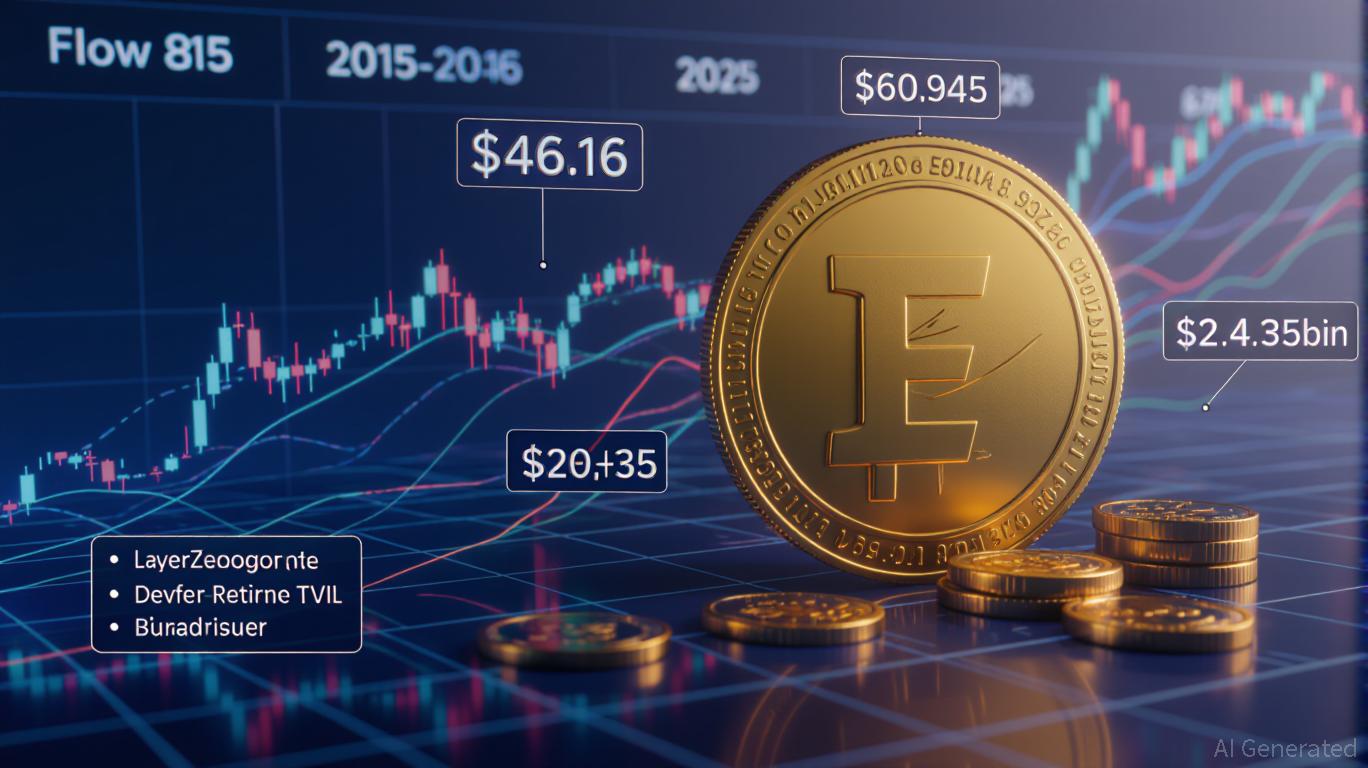Kalshi’s Solana Integration: A Strategic Catalyst for DeFi and Prediction Market Convergence
- Kalshi’s integration of Solana (SOL) as a deposit method bridges DeFi and regulated prediction markets, leveraging Solana’s high throughput and low costs. - The move attracted $1.4B in institutional capital in Q2 2025, with public companies staking $320M in SOL, enhancing liquidity and asset utility. - CFTC regulation and partnerships like Zero Hash ensure AML/KYC compliance, differentiating Kalshi from unregulated platforms and aligning with global regulatory trends. - Solana’s DeFi ecosystem benefits f
Kalshi’s integration of Solana (SOL) as a supported deposit method marks a pivotal moment in the convergence of decentralized finance (DeFi) and regulated prediction markets. By leveraging Solana’s high-throughput blockchain—capable of processing 65,000 transactions per second—and its low-cost infrastructure, Kalshi has positioned itself as a bridge between institutional-grade compliance and crypto-native innovation. This move not only expands access to prediction markets but also aligns with broader trends in institutional adoption, regulatory compliance, and DeFi liquidity.
Institutional Adoption and Liquidity Expansion
The integration of Solana into Kalshi’s ecosystem has already attracted significant institutional capital. In Q2 2025 alone, $1.4 billion in institutional treasuries flowed into Solana, driven by entities like Sharps Technology , Galaxy Digital , and Jump Crypto. Public companies, including Upexi , Inc., have staked 1.9 million SOL (valued at $320.4 million) at an 8% yield, signaling growing confidence in the asset’s utility and stability. Kalshi’s support for direct SOL deposits—without requiring conversion to stablecoins—addresses a key pain point for traders who prefer to hold native assets while accessing prediction markets. This flexibility, combined with deposit limits of up to $500,000, is expected to drive liquidity and volume growth, particularly for users with substantial Solana holdings.
Regulatory Compliance and Risk Mitigation
Kalshi’s CFTC-regulated status distinguishes it from unregulated platforms like Polymarket, offering a critical edge in attracting institutional participants. The partnership with Zero Hash ensures compliance with anti-money laundering (AML) and know-your-customer (KYC) frameworks, which are now mandatory under U.S. and EU regulations. By integrating AI-native AML tools and real-time transaction monitoring, Kalshi mitigates risks associated with illicit activities while maintaining the speed and efficiency required for high-frequency trading. This alignment with regulatory expectations is further reinforced by the approval of the Rex Osprey Solana Staking ETF (SSK) in June 2025 and the pending SEC decision on nine additional Solana spot ETF applications.
DeFi Synergy and Market Efficiency
The integration also strengthens Solana’s DeFi ecosystem by providing an additional utility for SOL. Prediction markets inherently require rapid settlement, and Solana’s low fees and high throughput make it ideal for this purpose. For instance, traders can now fund accounts and settle bets using Solana-based USDC , enhancing liquidity in markets tied to cryptocurrency price movements, legislative events, and macroeconomic indicators. This synergy between DeFi and prediction markets is expected to drive further innovation, such as tokenized derivatives and cross-chain interoperability, as Kalshi allocates $185 million from its Series C funding to infrastructure upgrades and contract development.
Conclusion: A Strategic Inflection Point
Kalshi’s Solana integration represents more than a technical upgrade—it is a strategic catalyst for redefining how institutional and retail investors interact with prediction markets. By combining Solana’s scalability with CFTC-regulated compliance, Kalshi is not only addressing the limitations of legacy systems but also setting a precedent for future DeFi-prediction market convergence. As institutional adoption accelerates and regulatory frameworks evolve, platforms that prioritize both innovation and compliance will dominate the next phase of crypto’s growth.
Source:
[1] A Game-Changer for Prediction Markets and DeFi Synergy
[2] Solana's Institutional Adoption and Network Momentum
[3] Solana (SOL) Institutional Adoption Surges as Public Companies Amass $591 Million
[4] Revolutionary Kalshi Solana Expansion: Unleashing New Prediction Market Opportunities
[5] Kalshi now accepts Solana deposits after adding Bitcoin ...
[6] Kalshi's Strategic Move to Integrate Crypto and Prediction Markets
[7] AML in 2025: How are AI, real-time monitoring, and global ...
[8] A Bullish Case for Institutional Adoption and DeFi Growth
[9] Kalshi now accepts Solana after adding support for Bitcoin,
[10] US prediction market Kalshi now accepts SOL deposits
Disclaimer: The content of this article solely reflects the author's opinion and does not represent the platform in any capacity. This article is not intended to serve as a reference for making investment decisions.
You may also like
XRP’s Post-Regulatory Clarity Momentum and Its Long-Term Institutional Viability
- XRP's 2025 SEC "not a security" ruling unlocked institutional adoption, with 11+ ETFs under review and $1.3T in cross-border transactions via Ripple's ODL. - Layer Brett (LBRETT) offers 55,000% APY staking and Ethereum Layer 2 scalability but faces regulatory risks as a meme-driven altcoin with speculative 100x-1,000x price projections. - XRP's institutional credibility contrasts with LBRETT's retail-driven model, as Ripple partners with major firms while LBRETT's deflationary structure and governance ex

Assessing the Significance of the $164.6M Spot ETH ETF Outflow: A Cautionary Signal or a Temporary Correction?
- U.S. spot Ethereum ETFs saw a $164.6M net outflow on Aug 29, 2025, ending a six-day inflow streak led by Grayscale and Fidelity funds. - The outflow coincided with Ethereum price dips below $4,300 amid inflation fears and geopolitical risks, contrasting with Ethereum's 71% YTD gains. - Institutional investors shifted capital to safer assets like TIPS due to Fed rate delays and Trump trade policies, while retail adoption via DeFi/NFTs and Layer 2 solutions remained robust. - Technical indicators show Ethe

Can Remittix (RTX) Overtake Dogecoin and Lead the 2025 Altcoin Surge?
- 2025 crypto market pits utility-driven Remittix (RTX) against meme-driven Dogecoin (DOGE), with RTX targeting $19T remittance inefficiencies via instant cross-border payments and deflationary tokenomics. - RTX’s $22.2M presale, institutional adoption, and CertiK-audited security contrast with DOGE’s speculative reliance on social sentiment and unlimited supply, risking long-term viability. - Market rotation favors RTX as Ethereum’s utility token classification boosts institutional inflows, while DOGE fac

Is Flow (FLOW) a Smart Long-Term Investment in a Post-2025 Crypto Market?
- Flow (FLOW) faces a shrinking market cap but shows ecosystem resilience in 2025's crypto landscape. - Technical analysis reveals bearish short-term pressure but bullish long-term projections up to $3.79 by 2030. - DeFi TVL growth (46% to $68M) and PayPal integration highlight fintech positioning amid $21.4B industry expansion. - Lags behind Solana ($108B) and Ethereum in scale but gains traction via 1M TPS roadmap and EVM compatibility. - Long-term viability depends on regulatory navigation and sustainin
